Occupy Central
Occupy Central is a civil disobedience movement which began in Hong Kong on September 28, 2014. It calls on thousands of protesters to block roads and paralyse Hong Kong's financial district if the Beijing and Hong Kong governments do not agree to implement universal suffrage for the chief executive election in 2017 and the Legislative Council elections in 2020 according to "international standards." The movement was initiated by Benny Tai Yiu-ting (戴耀廷), an associate professor of law at the University of Hong Kong, in January 2013.
OCCUPY CENTRAL - DAY 48: Full coverage of the day’s events
Sleeping rough at Occupy Central? Designers have your back with T-shirt mats
PUBLISHED : Friday, 14 November, 2014, 4:58am
Some of the team of designers work on turning the donated T-shirts into comfortable mats for protesters spending their nights on the streets of Admiralty. Photo: Sam Tsang
Occupy activists are transforming old T-shirts into works of art with a practical purpose - providing a little comfort for protesters sleeping on Hong Kong's hard streets.
 Pieced together on a wooden frame, the mats are the work of a group of friends already known for designing some of the many posters and stickers that have added colour throughout the Admiralty protest zone.
Pieced together on a wooden frame, the mats are the work of a group of friends already known for designing some of the many posters and stickers that have added colour throughout the Admiralty protest zone.
"We were thinking about what else we could do after making the posters and stickers," design graduate Ho Chan, 24, said, explaining how they came up with the idea for the mats.
"After all, everyone needs a good night's sleep," he said.
As he showed others how to do the work, he described how it took about three hours for three or four people to make a sleeping mat long enough for an adult of above-average height.
One mat featuring a yellow umbrella against a grey-scale backdrop has been on display since October 22 at "Umbrella Square" on Harcourt Road where Occupy leaders make their speeches.
Most recently, the designers have offered a T-shirt printing service, giving old T-shirts a new lease of life by printing them with a logo known as the "umbrella man" and the slogan: "Listen to our thoughts!" They thanked independent stores and printing services for helping.
Chan said he and his friends pooled funds and efforts to create a set of stickers with a minimalist design in black and yellow soon after tear gas was fired on protesters on September 28.
They started making the sleeping mats last month as it became clear there was going to be no early end to the mass sit-in.
Like many other Occupy protesters, Chan had never considered himself a social activist until very recently.
"I did not even join any of the rallies against the new town project in the northeastern New Territories," he said, in reference to the series of protests outside the Legislative Council in June, during which police were accused of using excessive force on both protesters and journalists.
"But after seeing on television the degree of violence police used on [teenage student leader] Joshua Wong [Chi-fung], I felt that it was now or never if we still wished to make ourselves heard."
This article appeared in the South China Morning Post print edition as Sleeping on the streets? These young designers have your back
Student leaders plan 'political protest' trip to Beijing
Trio led by Alex Chow hopes to meet Premier Li Keqiang and other officials over reform, as pan-democrat casts doubt over surrender plan
PUBLISHED : Friday, 14 November, 2014, 4:58am
Lawmaker Alan Leong
Three Federation of Students representatives will go to Beijing tomorrow to lodge a protest over the central government’s restrictive ruling on political reform.
It comes as Civic Party leader Alan Leong Kah-kit criticised a plan for the Occupy Central co-founders and their supporters to surrender to police next week.
Federation secretary general Alex Chow Yong-kang last night said the trip was a “political protest” after several people had refused to line up talks for them with leaders in Beijing.
Chow, Eason Chung Yiu-wa and Nathan Law Kwun-chung hope to meet Premier Li Keqiang, officials and delegates to the national legislature, which is behind the reform ruling.
“The central government has destroyed ‘one country, two systems’ over the past years,” Chow said. “[The trip] symbolises that Hongkongers are not afraid of Beijing’s manipulation.”
He said they were not sure if they would be allowed entry. The trip would be cancelled if police cleared protest sites in Admiralty and Mong Kok beforehand.
Meanwhile, Leong, who is a barrister, said that if Benny Tai Yiu-ting and his allies carried out their plan, they would be turning their backs on student protesters if they did not return to the sit-ins afterwards.
But if they did go back, their move would become just a “gesture” as they would merely be going through the motions at the police station, Leong said.
Student leaders have said they would rather be arrested than give themselves up. It is believed that Tai, his Occupy co-organisers Dr Chan Kin-man and the Reverend Chu Yiu-ming and their backers are still discussing the idea of going to the police on November 21 or 22. That would fulfil their vow to shoulder legal responsibility for the civil disobedience action that has paralysed the city’s streets.
But Leong had his doubts. “I have difficulty understanding the Occupy trio,” the lawmaker told the Post, when asked if he would join them in surrendering. The senior counsel continued: “If the police really want to arrest any of us, they would first of all have drafted … the charge, and then they will come … and arrest us.
“Turning yourself in at a police station [takes] 10 minutes at most. They will just give you a white card with a report book number on it. Mr Leong, this is your report book number, the number is 1234. You can go away’ … So this is a gesture more than anything else.”
He questioned if it was the right time to surrender, given that many protesters would not leave the sit-ins. “There is no way that, after turning myself in, and while the movement is still going on, I would turn my back on the students [by not returning]. And if you are not doing that, what is the point of turning yourself in on an arbitrary date?”
More importantly was what the move would mean for the future of the democracy campaign. Stressing the need for public support, Leong said it was time to “take stock” of what had been attained so far. “I certainly would not want to see the achievements [lost] as a result of our losing of the sympathy of [Hongkongers].”
Separately, a loyal supporter of Chief Executive Leung Chun-ying said Beijing had not narrowed the city’s autonomy as stated in the Basic Law. Rather, it had interpreted Hong Kong’s mini-constitution “way too loosely” in the 17 years since the handover, leading to the protests, Ronnie Chan Chichung said.
“There was a guiding principle in Beijing: the best way to administer Hong Kong is not to touch it at all,” Chan told students at the University of Science and Technology. But this policy had been wrong, he said. “The result? You can see that in Central.”
Chan said he had told Beijing that the governance problem, including Occupy, was rooted in the lack of a sense of nationhood. “The hearts of Hong Kong people are still not [with] China.”
He also criticised the Hong Kong government’s failure to bring in national education in schools. “It’s really ridiculous not having that kind of education.”
This article appeared in the South China Morning Post print edition as Student leaders plan ‘protest trip’ to Beijing
Judge refuses to delay injunction that lets police help clear protesters
Appeal to be heard today on ruling that paves the way for police to help clear Mong Kok sites
PUBLISHED : Friday, 14 November, 2014, 4:58am
Protesters in Mong Kok during "Occupy Central" movement. Photo: Felix Wong
A High Court judge yesterday refused to delay an injunction that will allow the police to assist bailiffs in clearing Occupy protest areas in Mong Kok and even arrest people who obstruct them.
Two defendants, Dominic Fok Wai-pong and Ng Ting-pong, had filed applications to stay the court order, and also asked for leave to appeal after Mr Justice Au Hing-cheung rejected their application yesterday. The case will be heard in the Court of Appeal this afternoon.
The protesters' legal team argued that the judge's ruling had been in error because he addressed the question of public order by way of civil litigation, but not by the government itself.
They also said the drivers' group that applied for the injunction had failed to show they suffered substantial losses beyond those of the rest of the public.
But Au found those grounds were not arguable and refused to grant them leave to appeal.
He told the lawyers for the taxi and minibus drivers' group that he would hand down the order of injunction no later than today.
Solicitor Maggie Chan Man-ki, for the minibus drivers, said that once they had the order they would follow all proper procedures, including publishing the terms of the order in newspapers and putting it up at protest areas before taking action.
Barrister Margaret Ng, for the protesters, complained that the court and plaintiffs had failed to inform people in protest areas about the terms of the order since the judge handed down the judgment on Monday.
"The order will affect a lot of people in the area. They have the right to know details of the court order and how it will be carried out. Otherwise, it will be unfair," Ng said.
Occupy protesters in Mong Kok said they had seen unusual police behaviour this week and were preparing to retake areas if they were cleared.
"We will not give up [the occupied streets] unconditionally," said Man Ip, 20, who has been camping in the protest areas.
Secretary for Justice Rimsky Yuen Kwok-keung said police action would be justified. Although court injunctions were civil in nature, Yuen said an open refusal to comply with them constituted a "collateral criminal act in contravention of the rule of law".
Meanwhile, 31 Occupy activists who were arrested during a clash with police in Lung Wo Road on October 15 were freed unconditionally yesterday. They had refused to keep making regular visits to a police station to renew their bail.
Julie Chu, Samuel Chan, Stuart Lau, Ng Kang-chung and Jeffie Lam
This article appeared in the South China Morning Post print edition as Judge refuses to delay injunction on protesters
Hong Kong High Court order sets up clearance attempt at Occupy Mong Kok next week
PUBLISHED : Friday, 14 November, 2014, 4:25pm
Police keep watch next to a barricade at the Mong Kok protest camp on Friday. Photo: Kyodo
A High Court judge has handed down an extended injunction that could allow police to assist bailiffs in clearing pro-democracy protest sites in Mong Kok – and arrest protesters who resist the orders.
A lawyer for a taxi drivers’ group that applied for the injunction to clear the Mong Kok site said the group may publish the terms of the order in newspapers on Monday.
Once protesters have been informed of the court order an attempted site clearance could begin at any time.
Mr Justice Au Hing-cheung ruled that, under the Police Ordinance sections 51 and 52, officers could detain arrested people for no more than 48 hours and would have to bring those arrested to a police station.
Meanwhile in Admiralty this morning protesters temporarily removed parts of barricades to allow delivery trucks to enter Citic Tower from Tim Mei Avenue.
Since the start of the street protests in September, barricades have been in place around the entrances to Citic Tower’s car park.
On Monday the High Court extended an injunction granted to Goldon Investment, the owner of Citic Tower, authorising bailiffs to clear the barricades.
Hong Kong needs a political solution, not a legal one, to Occupy protests
Stephanie Cheung says clearing the streets of protesters will only result in a hollow victory for the government. Rather, it should bridge the social divide by responding fully to the concerns raised
PUBLISHED : Friday, 14 November, 2014, 5:33pm
In the six weeks of protest, only one formal meeting has taken place between government officials and the protesters.
President Xi Jinping has made it clear that the buck stops with the chief executive for bringing the "umbrella movement" to a close. Chief Secretary Carrie Lam Cheng Yuet-ngor has made it clear that there is to be no further room for negotiation with the students, while Chief Executive Leung Chun-ying has acknowledged that the Occupy protest is the biggest social movement Hong Kong has faced in its history.
With US President Barack Obama stating unequivocally that the US had no involvement in fostering the movement, blaming it on foreign instigation is no longer tenable. The government should at last face the fact that the movement is a social/political issue requiring a social/political solution, instead of pretending it is a law-and-order issue to be solved by the police, or a rule-of-law issue to be solved by the law courts.
The government has been playing the protest out like a court case, as it reckons that, on the one hand, by dragging it out, the movement will fizzle out naturally as support diminishes, while on the other, it always has the option of forcible eviction by the police. Either way, the government wins - or so it would seem.
However, a far-sighted government would realise that such an approach will lead to a pyrrhic victory.
In the 40-odd days of protests, only one formal meeting has taken place between government officials and the protesters, and that was at the request of the Federation of Students. The students have come up with lists of different demands, whereas the government declines negotiation. This is most frustrating, not only to the protesters, but also to the public, who have to suffer the consequences of this deadlock.
We need not take too literally the protesters' demands for a reversal of the electoral framework of August 31, and open nominations. Instead, we can be unified behind their cry for a more just society, where political power is better shared. We need to keep these youth engaged and motivated instead of alienating them and killing off their enthusiasm.
One 15-year-old student described her ordeal when the police used tear gas on protesters. The fear and pain she went through, she said, was nothing compared to the pain in her heart. She was shocked and indignant that rulers would use violence against citizens expressing an opinion out of love for Hong Kong.
That kind of trauma is in the collective memory of the protesters. Even after the protests are quashed and the streets cleared, unless the government wins back the hearts of its youth, there will be wide-scale disaffection, and distrust and disrespect for the authorities.
As things stand, the government is unlikely to muster the two-thirds majority support needed in the Legislative Council to pass its electoral reform proposal. Even if the protests end, reforms will still not get off the ground.
The government will encounter more and more difficulties in pushing through policies (even for non-political issues). The pan-democratic camp has pledged non-cooperation until the demand for civic nomination of the chief executive is resolved, while the occupiers have the ability to gather in great numbers at short notice to protest.
Unless the government uses this opportunity to reach out, in the long run, Hong Kong will become ungovernable.
It is still not too late for our government to listen and build a bridge across the political divide to forge a consensus. The public should be invited to express their opinions through a formal consultation, with a view to reaching a broad consensus in the community.
Lam has already offered the students a two-pronged process to deal with the issue of nomination of the chief executive: one, by making a report to the Hong Kong and Macau Affairs Office; and, two, by setting up a multiparty platform for further discussions.
All it requires is for the government to go one step further, to upgrade the report and discussion platform to a formal consultation resulting in a supplementary report to the National People's Congress. This should satisfy the demand of the protesters for the original report to be changed.
The government should also consider an amnesty arrangement, to grant a general pardon for protesters who leave the Occupy sites by an agreed deadline. After that, obstruction in public places could be prosecuted without impunity. This will avoid the scenario of the police being swamped by thousands of protesters turning themselves in, and each making long political speeches in court.
An amnesty would secure peace of mind for the protesters. It would also deter further protests, as those who persist in occupying the streets after the deadline would be unlikely to gain public sympathy. In that way, order may be restored with the least resentment, and without resorting to force by the police.
The issue of an amnesty has to be broached sensitively, as the Occupy Central participants have committed from the start to surrender themselves to the police. Neither did the students ask for amnesty. Without sensitive handling, such an offer of an amnesty or the imposing of a non-consensual deadline will probably be seen as an insult, motivating resistance and martyrdom.
The extent and duration of the protest proves that the government has been out of sync with the younger generations. The administration should heed this wake-up call by creating a channel for our youth to voice their opinion, and tapping their talents.
The supplementary consultation may also invite suggestions on ways to heal the community now torn by extreme polarisation. Hong Kong has always thrived on the diversity of its people. Diversity in opinion is nothing to be feared. If we remain level-headed, respectful and caring of one another, we can resolve the conflict. It is within the government's power to usher all parties onto a constructive path of building and healing.
Stephanie Cheung participated in the student movements in the 1970s, and is currently a solicitor and mediator, and volunteer in youth work and education
This article appeared in the South China Morning Post print edition as Political fix
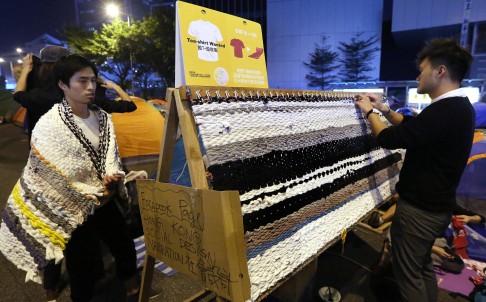
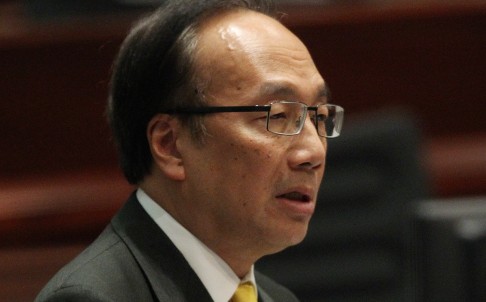
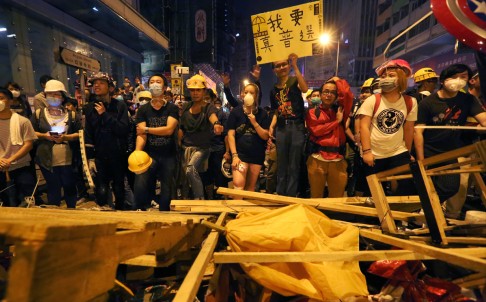

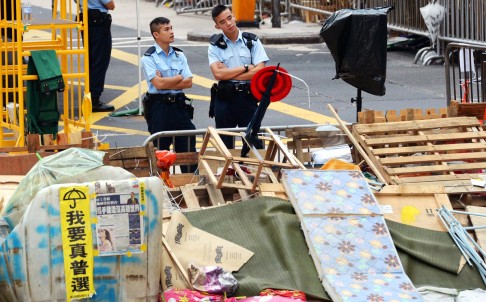
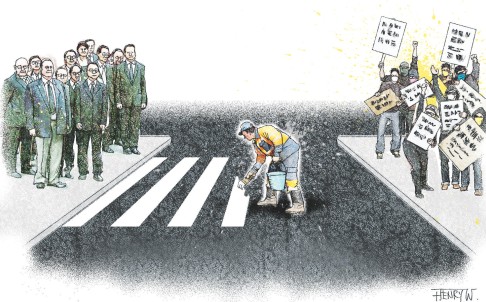
沒有留言:
張貼留言